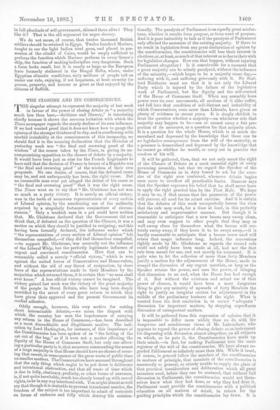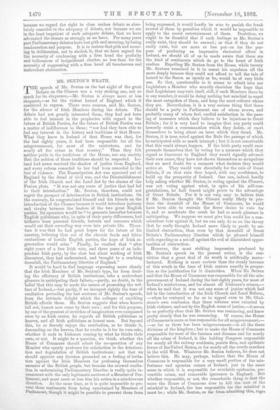THE CLOSURE AND ITS CONSEQUENCES.
THE singular attempt to represent the majority of last week in favour of the power of closing debate as "a majority much less than bare,—fictitious and illusory," is interesting chiefly because it shows the nervous irritation with which the Times newspaper regards the steady decline of its own influence. If we had wanted proof that it does not know how to gauge the opinioo of the stronger thinkers of to-day, and is overflowing with morbid irritability at the consciousness of this incapacity, we should find it in the amazing declaration that the Division of yesterday week was "the final and crowning proof of the wisdom" of the course taken by the Times, in giving its un- compromising opposition to the closure of debate by a majority. It would have been just as wise for the French Legitimists to have said that the decision of France in favour of a Republic was "the final and crowning proof" of the wisdom of their own proposals. No one denies, of course, that the defeated cause may be, and not unfrequently has been, the right cause. But no reasonable man ever yet alleged the defeat of his cause as "the final and crowning proof" that it was the right cause. The Times went on to say that Mr. Gladstone has not won so much as a party victory. It is merely an official victory, won in the teeth of numerous representatives of every section of Liberal opinion, by the unrelenting use of the authority acquired by a singularly fortunate conjuncture of circum- stances." Only a weakish man in a pet could have written that. Mr. Gladstone declared that the Government did not think that, if defeated on the question of the Closure, it was a matter on which they should be justified in resigning; and this having been formally declared, the influence under which "the representatives of every section of Liberal opinion" felt themselves compelled,—if they did feel themselves compelled, —to support Mr. Gladstone, was assuredly not the influence of the Liberal Whip, but the perfectly legitimate influence of urgent and convinced constituencies. How that can be reasonably called a merely "official victory," which is won against the united forces of Conservatives and Home-rulers, and without the aid of any threat of resignation, by sheer force of the representations made to their Members by the majorities which returned them, it is certain that "no man shall ever know." A less official victory cannot be imagined. The victory gained last week was the victory of the great majority of the people in Great Britain, who have long been deeply mortified by the arrest of every great reform to which they have given their approval and the present Government its Cordial adhesion.
Oddly enough, however, this very motive for cutting short interminable debates,—we mean the disgust with which the country has seen the hopelessness of carrying any reform in the House of Commons,—has. been described as a most discreditable and illegitimate motive. The indi- cation by Lord Hartington, for instance, of this impatience of the Constituencies has been spoken of as "the letting of the cat out of the bag," as if it were not a matter affecting the dignity of the House of Commons itself, but only one affect- ing a particular party in it, that measures commanding the assent of a large majority in that House should have no chance of secur- mg that assent, in consequence of the gross waste of public time on smaller matters. The Conservatives have assumed throughout that the only thing which ought to be put down is deliberate and intentional obatruction, and that all waste of time which is due to folly: obstinacy, prolixity, or other forms of unreason, is, if not quite inevitable, much too closely bound up with sacred
rights, to be in an i anyway interfered with. You might almost as well i say that though t s desirable to prevent intentional murder, the freedom of the subject 18 too important to admit of restraints on forms of rashness and folly which destroy life uninten- tionally. The paralysis of Parliament is an equally great misfor- tune, whether it results from purpose, or from want of purpose. And it is pure imbecility to talk as if the paralysis of Parliament only affected the measures of the existing majority. If there be no result in legislation from any great declaration of opinion by the constituencies, the constituencies will lose their interest in elections, or, at least, as much of that interest as is due to their wish for legislative changes. How can that happen, without injuring Parliament altogether ? Is it conceivable for a moment that a great majority can be utterly paralysed, without the influence of the minority,—which hopes to be a majority some day,— suffering with it, and suffering grievously with it. Sir Staf- ford Northcote must see that it is not only the Liberal Party which is injured by the failure of the legislative work of Parliament, but the dignity and the self-control of the House of Commons itself. When any assembly loses power over its own movements, all sections of it alike suffer, and fall into that condition of self-distrust and irritability of which Conservatives, even more than Liberals, have given us plenty of evidence in recent years. It is simply childish to treat the question whether a majority—on whichever side that majority may happen to be—can or cannot carry a fair pro- portion of its measures, as a question for that majority alone. It is a question for the whole House, which is as much de- moralised and depressed by the knowledge that there can be no legislative consequences from the will of the majority, as a prisoner is demoralised and depressed by the knowledge that he cannot go whither he would, or carry out in practice the resolves of his will.
It will be gathered, then, that we not only assert the right of the Closure of Debate as a most essential right of every governing assembly, but that we regard the Speaker of the House of Commons as in duty bound to ask for the exere cise of the right now conferred, whenever debate begins once more to overflow all practicable limits. Rumour says that the Speaker expresses his belief that he shall never have to apply the right granted him by the First Rule. We hope it may be so, if that means that the possession of the power will prevent all need for its actual exercise. And it is certain that the debates of this week unexpectedly favour the view that the rule may work, for a time at least, in this perfectly satisfactory and unprovocative manner. But though it is reasonable to anticipate that a new broom may sweep clean, and may even suggest to other people that they may as well sweep clean for themselves what the broom will cer- tainly sweep away, if they leave it to be swept away,—it is hardly reasonable to anticipate that a broom never used will retain that magic influence long. Indeed, the concessions rightly made by Mr. Gladstone as regards the second rule could not safely have been made at all, had not the first rule been meant for use, and not merely for ornament. It is quite wise to let the adhesion of more than forty Members justify a motion for the adjournment of the House, made to compel the discussion of any urgent question, so long as the Speaker retains the power, and uses the power, of bringing that discussion to an end, when the House has had enough of it. But without the existence and actual use of that power of closure, it would have been a most dangerous thing to give any minority of upwards of forty Members the right to justify an irregular motion for adjournment in the middle of the preliminary business of the night. What is wanted from the first resolution is, to secure " adequate " discussion for important matters, by stopping superfluous discussion of unimportant matters.
It will be gathered from this expression of opinion that it is impossible to differ more widely than we do with the dangerous and mischievous views of Mr. Labouchere, who appears to regard the power of closing debate as an instrument for dispensing with discussion almost altogether, on all subjects on which, as he puts it, the Constituencies have made up their minds,—in fact, for making Parliament into the mere registrar of the will of the constituencies. We have. always re. garded Piirliament as infinitely more than this, 'Mule it must, of course, in general follow the mandate of the constituencies in matters of principle, that mandate of the constituencies is necessarily so general, so utterly unable to Supply the place of that practical consideration and deliberation which all great measures need, before they can be .matured, that without full discussion in Parliament, the constituencies would not them- selves know what they had done, or why they had done it. Parliament must provide the constituencies with a political education on all matters of detail, in return for the guiding principles which the constituencies lay down. It is
because we regard the right to close useless debate as abso- lutely essential to the adequacy of debate, not because we are in the least impatient of such adequate debate, that we have advocated the closure as strongly as we have. For many years past Parliamentary debates have lost pith and meaning, by losing condensation and purpose. It is to restore that pith and mean- ing to deliberation, not to abolish it, that we have argued for the necessity of condensing with a firm hand the prolixity and tediousness of insignificant chatter, no less than for the necessity of suppressing with a firm hand all treacherous and malevolent obstruction.



































 Previous page
Previous page